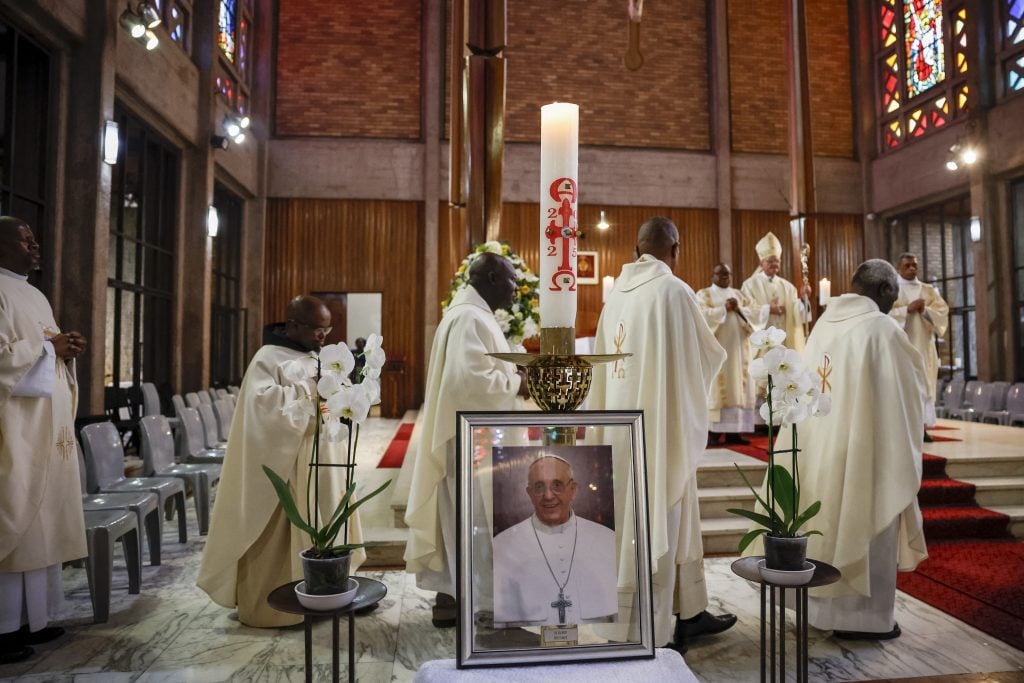The death of Pope Francis at the age of 88 on Easter Monday prompted fulsome tributes from African leaders, who hailed his twelve years at the helm of the global Catholic Church.
Nigeria’s President Bola Tinubu called Pope Francis a “tireless champion of the poor” and his South African president Cyril Ramaphosa highlighted his “world view of inclusion [and] equality.”
Egyptian President Abdel Fattah El-Sisi extended his condolences to the Vatican, stating that the late Pope “leaves behind an extraordinary legacy of compassion and humanity that will forever remain etched in the conscience of mankind.” King Mohammed VI of Morocco paid tribute to Pope Francis’s “dedication to combatting marginalisation and poverty and defending human dignity.”
From Rome to Rio De Janeiro, the Pope’s loss is felt keenly by Catholics around the world and particularly in the African countries that are home to an estimated 272 million Catholics
According to the Vatican, over the past year alone, seven million Africans have converted to Catholicism, making the continent home to one of the fastest-growing Catholic populations in the world.
Nigeria and Kenya have among the highest weekly Catholic church attendance rates globally, while the Democratic Republic of Congo, Cameroon, Uganda and Angola also have strong Catholic communities.
Francis’ 12 years in office were marked by highs and lows as he continued to pursue social justice and modernise the Catholic mission, while struggling with the fallout the church suffered in the wake of scandals. Seen by some as a trailblazer, upon his election as Bishop of Rome in 2013, he became the first Latin American Pope, the first Pope from the Southern Hemisphere, and the first Pope from outside Europe since the 8th-century Syrian pope Gregory III.
Strengthening Africa within the Church
The continent has, for many years, been an important bastion of faith for the Catholic church, and the importance of its momentum was recognised by Pope Francis who significantly increased African representation within the College of Cardinals during his papacy in a gesture of trust in the continent’s leadership potential. He travelled to the African continent five times during his pontificate and visited 10 African countries in all; his journeys were defined by messages of peace, social and environmental justice and interfaith dialogue.
Pope Francis’s first visit to the continent was in November 2015 when he visited Kenya, Uganda, and the Central African Republic. He celebrated mass at the University of Nairobi; he honoured the Ugandan Martyrs at the Namugongo shrine and, in a historic move, he visited the Central African Republic despite civil unrest, declaring himself a “pilgrim of peace” and shared his hope of unity and an end to conflict.
Pope Francis’s first visit to North Africa, and a country with a Muslim majority, came in 2017 when he visited Egypt with the aim of strengthening interfaith relations. He visited Al-Azhar University and met with Grand Imam Ahmed el-Tayeb, and also expressed solidarity with Egypt’s Coptic Christians following attacks on their community earlier that year.
Accepting an invitation from King Mohammed VI in 2019, Pope Francis visited Morocco, where he furthered his message of religious tolerance and the rights of migrants. During an address at the Hassan Tower in Rabat, he called for cross-cultural cohesion, declaring that “courage to encounter one another and extend a hand of friendship is a pathway of peace and harmony for humanity… whereas extremism and hatred cause division and destruction.”

Later in the same year, the Pope visited Mozambique, Madagascar, and Mauritius, advocating for peace and reconciliation following the years of conflict that Mozambique had faced.
He also called for protection of island nations’ natural resources and biodiversity. He quoted his papal namesake, Saint Francis of Assisi, in declaring that “Madagascar is famous for its natural beauty and for this, we say Laudato Si [taken from St Francis’s Canticle of the Creatures]…it is our duty to look after it with care.”
Peacemaker
Pope Francis’s last visit to the continent was also one of the most important politically. In 2023 he visited South Sudan and the Democratic Republic of Congo on a dedicated peace mission that included the then-Archbishop of Canterbury Justin Welby. Four years previously, in what was one of the most symbolic moments of his papacy, Pope Francis had knelt on the floor of the Vatican and kissed the feet of South Sudan’s rival leaders. In Juba he made an ecumenical pilgrimage to promote peace in the region.
The Pope’s visits to the continent were emblematic of his deep-rooted commitment to addressing current global issues through compassion and dialogue. One of his most impactful and famous speeches, given in Kinshasa in 2023, contained the memorable line “Hands off the Democratic Republic of the Congo! Hands off Africa! Stop choking Africa; Africa is not a mine to be stripped or a terrain to be plundered!”
Pope Francis’s relationship with Africa was grounded in mutual respect; he saw African Catholics not as recipients of charity, but as co-creators of the church’s future.
Eyes on successor
As the world mourns, attention is now turned to the Pope’s successor. It has been over 1,500 years since the Catholic church has been headed by a Pope from the African continent. In the papacy’s history, three of its 266 popes have come from Africa; Pope Victor I (dates of tenure estimated to be circa 199 AD), Pope Miltiades (311 AD to 314 AD) and Pope Gelasius I (492 to 496 AD) came from Africa Proconsularis, a historic Roman province which now encompasses much of modern-day Tunisia.
There are 18 cardinals from the African continent eligible to be elected as Pope at the upcoming conclave; they include Ghanaian Cardinal Peter Turkson who was a key advisor to Pope Francis, Guinean Cardinal Robert Sarah who served as prefect of the Congregation for Divine Worship and the Discipline of the Sacraments from 2014 until 2021, and Cardinal Dieudonné Nzapalainga from the Central African Republic who, at 57, is one of the youngest cardinals.
Speaking to the BBC this week, Father Stan Chu Ilo, president of the Pan-African Catholic Theological Network said that “an African Pope is not a question of ‘if’ but ‘when’… the Catholic Church in Africa is now a theological, spiritual, and demographic powerhouse.” Conversely, Archbishop of Abuja Ignatius Kaigama stated “We are not praying for an African Pope… we are praying for a good and holy Pope.”
When the black smoke famously becomes white, it is clear that whatever lies ahead for the Catholic church, Africa is no longer on its periphery.
Crédito: Link de origem


